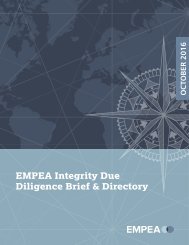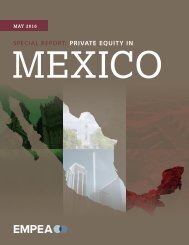You also want an ePaper? Increase the reach of your titles
YUMPU automatically turns print PDFs into web optimized ePapers that Google loves.
gains, even if it involves <strong>of</strong>fshore transactions (recently<br />
implemented in e.g., Kenya and Tanzania). Leaving aside<br />
the issue <strong>of</strong> enforcement (which requires transparency<br />
and information sharing), efforts to collect taxes at source<br />
(including capital gains tax) should somewhat mitigate the<br />
concerns related to tax evasion.<br />
Taxation is a contentious subject and has become more<br />
so since the financial crisis. Governments struggling with<br />
mounting deficits have become more vigilant in verifying<br />
that companies and investment companies pay their<br />
obligations. Supported by civil society, governments in<br />
developing countries including Africa have increased their<br />
efforts to capture tax revenues from international investors<br />
in order to fund economic development—even if they are<br />
sometimes conflicted in this endeavour by their desire to<br />
be tax competitive vis-à-vis their regional neighbours. Also,<br />
in light <strong>of</strong> rising inequality there is a desire to ensure that<br />
financial investors are not treated more favourably than<br />
ordinary citizens. As a result, tax is at the heart <strong>of</strong> many <strong>of</strong><br />
the debates surrounding ‘<strong>of</strong>fshore’ financial centres.<br />
Tax is <strong>of</strong>ten a cornerstone <strong>of</strong> the competitiveness <strong>of</strong> regional<br />
and in particular administrative centres. Favourable tax<br />
policies have <strong>of</strong>ten been used by certain jurisdictions in<br />
order to attract the financial community. Certain countries<br />
with robust fiscal positions such as Dubai have always had<br />
very low taxes, both personal and corporate. Others such<br />
as Ireland have proactively adopted favourable corporate<br />
and personal tax regimes in order to attract businesses.<br />
Given that capital is increasingly mobile, investors will<br />
look closely at tax in order to assess the attractiveness <strong>of</strong><br />
different locations.<br />
However, it is worth looking in a little detail at the nature<br />
<strong>of</strong> the various taxes that might apply in the course <strong>of</strong> this<br />
debate. This may shed light on which taxes are the most<br />
important for investors. Investors and fund managers will<br />
be most concerned at a business level with taxes on pr<strong>of</strong>its<br />
and on the ability to repatriate pr<strong>of</strong>its in hard currency<br />
without punitive charges. They will also want to have the<br />
ability to make investments cross borders without incurring<br />
additional taxes or charges (or being taxed twice on the<br />
same pr<strong>of</strong>it). This involves having favourable double tax<br />
treaties between various countries. Beyond the absolute<br />
levels <strong>of</strong> tax, businesses also favour regimes that are<br />
relatively simple and easy to understand. There should be a<br />
readily available supply <strong>of</strong> legal firms and accountants that<br />
can enable international investors to transact easily and<br />
with little extra transaction costs.<br />
This creates incentives for companies, banks and funds<br />
to use certain jurisdictions for either setting up funds or<br />
financial vehicles which can act as conduits for investment.<br />
This seems entirely logical since companies and investors<br />
are seeking to maximise their net returns. But the practice<br />
<strong>of</strong> using ‘tax efficient’ jurisdictions is attracting criticism.<br />
This is primarily on the basis that many companies or<br />
investment funds have substantial activities in particular<br />
countries but they pay very little tax in those countries at the<br />
corporate level.<br />
The private equity industry has come under criticism for<br />
using only certain tax efficient jurisdictions for creating their<br />
funds and for all the administrative functions that surround<br />
them. Centres such as the Cayman Islands, Luxembourg<br />
and Mauritius have been able to benefit substantially from<br />
this. In the case <strong>of</strong> Africa, Mauritius has benefitted from<br />
many funds and financial vehicles which have been created<br />
for investing into Africa. NGOs and others have argued that<br />
this activity should be rightfully located ‘onshore’ in one<br />
<strong>of</strong> the major African markets such that the development<br />
benefits can be captured there. However, it should be<br />
borne in mind that Mauritius does not only serve as an<br />
‘administrative financial centre’ for African markets but also<br />
for other significant investment destinations such as India.<br />
This means it captures a significant amount <strong>of</strong> business and<br />
hence is able to build expertise and scale. The providers<br />
<strong>of</strong> these services can benefit from economies <strong>of</strong> scale that<br />
allow them to be competitive on costs.<br />
Beyond that, personal taxation needs to be competitive<br />
to make it worthwhile for foreign pr<strong>of</strong>essionals to consider<br />
being based in the financial centre. By itself, personal<br />
taxation policy is relatively less important in its ability to<br />
attract financial institutions or investment funds. Even in the<br />
UK where personal taxation rates were increased after the<br />
financial crisis <strong>of</strong> 2008, few firms relocated to other centres.<br />
But to <strong>of</strong>fer meaningful advice on tax, more work is needed<br />
to understand the incentives that guide the actions <strong>of</strong><br />
fund managers. In light <strong>of</strong> this, one can better understand<br />
whether certain African countries would be able to create<br />
tax environments that are better able to compete. However,<br />
the tax analysis would need to include not only national tax<br />
policy but also aspects <strong>of</strong> tax on cross border capital flows<br />
and double taxation treaties.<br />
<strong>Conduits</strong> <strong>of</strong> <strong>Capital</strong> – Onshore Financial Centres and Their Relevance to African Private Equity<br />
| 109





